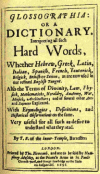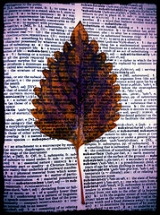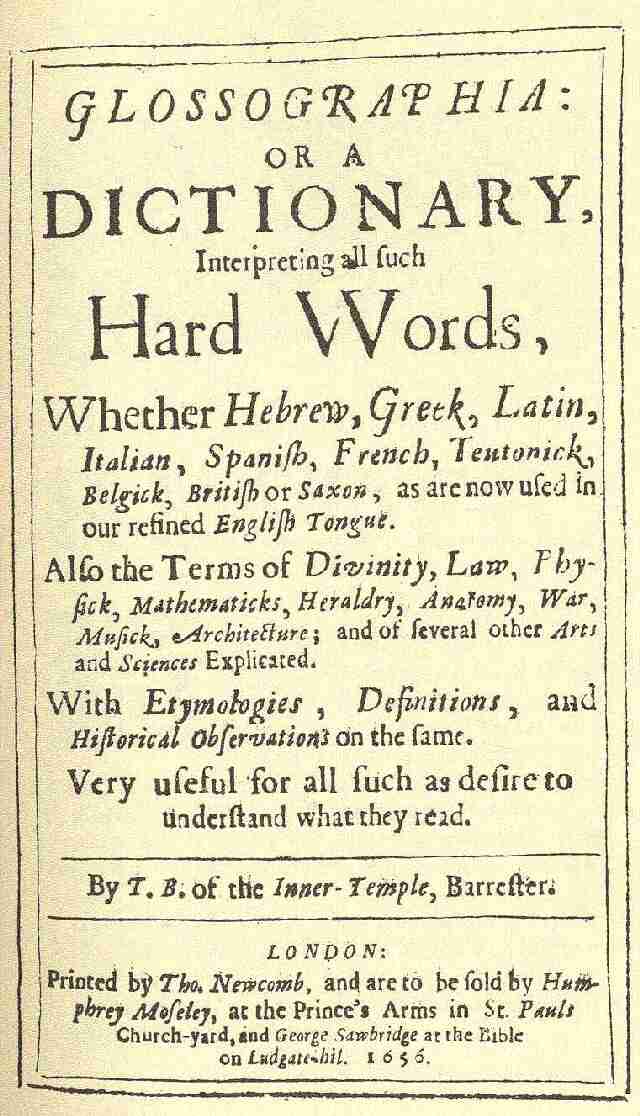
.
Compendium of Lost Words
Dedication: Thomas Blount
| A-E | F-M | N-R | S-Z | Index |
Thomas Blount (1618-1679)
Thomas Blount was born in 1618 in Bordersley, Tardebigg, Worcestershire, and was the son of one Myles Blount of Orleton, Herefordshire. He trained as a lawyer and was called to the bar at the Inner Temple. However, due to his practice of the Roman Catholic religion, he experienced considerable difficulty in practicing that profession at a time when Catholics were excluded from almost all aspects of public life in England. While this turn of events was no doubt disastrous for Blount, it was very fortunate for us, for it appears that it was for this reason that he was able to find time for literary pursuits.
 Chief among his publications was his Glossographia of 1656 (click on image on the right to view the title page of the original edition), It defined around 11,000 hard or unusual words, and was the largest English dictionary when it was published. It is thus an enormous intellectual ancestor of my own Phrontistery. His was the last, largest and greatest of the English 'hard-word' dictionaries, which aimed not to present a complete listing of English words, but to define and explain unusual terms that might be encountered in literature or the professions, thus aiding the burgeoning non-academic middle class, which was ascendant in England at the time and of which Blount was a member. Glossographia marked several 'firsts' in English lexicography: it was the first dictionary to include illustrations (two woodcuts of heraldic devices), the first to include etymologies, and the first to cite sources for the words being defined. It contained many highly unusual words that had not previously been included in dictionaries and others which are not included in any later dictionaries. While some of these were neologisms, Blount did not coin any words himself, but rather reported on the rather inventive culture of classically inspired coinages of the period. Because so many of these words do not appear in most other dictionaries, Glossographia is a treasure-trove of 'lost words' and thus makes an invaluable contribution to this Compendium.
Chief among his publications was his Glossographia of 1656 (click on image on the right to view the title page of the original edition), It defined around 11,000 hard or unusual words, and was the largest English dictionary when it was published. It is thus an enormous intellectual ancestor of my own Phrontistery. His was the last, largest and greatest of the English 'hard-word' dictionaries, which aimed not to present a complete listing of English words, but to define and explain unusual terms that might be encountered in literature or the professions, thus aiding the burgeoning non-academic middle class, which was ascendant in England at the time and of which Blount was a member. Glossographia marked several 'firsts' in English lexicography: it was the first dictionary to include illustrations (two woodcuts of heraldic devices), the first to include etymologies, and the first to cite sources for the words being defined. It contained many highly unusual words that had not previously been included in dictionaries and others which are not included in any later dictionaries. While some of these were neologisms, Blount did not coin any words himself, but rather reported on the rather inventive culture of classically inspired coinages of the period. Because so many of these words do not appear in most other dictionaries, Glossographia is a treasure-trove of 'lost words' and thus makes an invaluable contribution to this Compendium.
Unfortunately for Blount, his Glossographia was surpassed in popularity with the publication in 1658 of The New World of Words by Edward Phillips (1630-1696), whose uncle was John Milton. While Phillips' dictionary was much larger than Blount's (ca. 20,000 words) and included some common words in addition to unusual ones, it is now widely acknowledged that Phillips pilfered definitions shamelessly from Blount, and a side-by-side comparison easily confirms this fact. While no dictionary is (or should be) free from influence from earlier works, the similarities in style and specific form of definitions between the two works probably crossed the line. This act of plagiarism enraged Blount, who began to denounce his rival vitriolically in print. Blount and Phillips engaged for many years in a publishing war, undertaking constant revisions of their works accompanied by denunciations of the other. In 1673, Blount published A World of Errors Discovered in the New World of Words, wherein he sought to demonstrate that where Phillips was correct, he was not often original, and that where he was original, he was not often correct. He wrote, indignantly, "Must this then be suffered? A Gentleman for his divertissement writes a Book, and this Book happens to be acceptable to the World, and sell; a Bookseller, not interested in the Copy, instantly employs some Mercenary to jumble up another like Book out of this, with some Alterations and Additions, and give it a new Title; and the first Author's out-done, and his Publisher half undone. . ." Phillips retorted by publishing a list of words from Blount that he contended were "barbarous and illegally compounded." The dispute was not settled prior to Blount's death, thus granting a default victory to Phillips. Regardless, Glossographia went through many editions and even more reprintings, the latest of which was in 1969.
In addition to his dictionary, Blount published widely on other subjects. His Boscobel (1651) was a propagandistic account of the preservation and escape to France of the young King Charles II after his father's execution. Blount remained an amateur scholar of law throughout his life, and published Nomolexicon, a dictionary of legal terms (1670), to aid that profession which he was unable to practice. He was also an antiquarian of some note, and his Fragmenta Antiquitatis (1679) is a sort of encyclopedia of folk-customs and manorial traditions.
Thomas Blount married Anne Church of Maldon (1617-1697) in 1661 and they had one daughter, Elizabeth (1662-1724). He died on December 26, 1679 at Orleton, Herefordshire at the age of sixty-one. Though he is less well-known as an early dictionary-writer today than later authors such as Johnson and Webster, he was a pioneer and a true scholar, and for this we owe him much gratitude.
I hope you have found this site to be useful. If you have any corrections, additions, or comments, please contact me. Please note that I am not able to respond to all requests. Please consult a major dictionary before e-mailing your query. All material on this page © 1996-2021 Stephen Chrisomalis. Links to this page may be made without permission.
| A-E | F-M | N-R | S-Z | Index |








